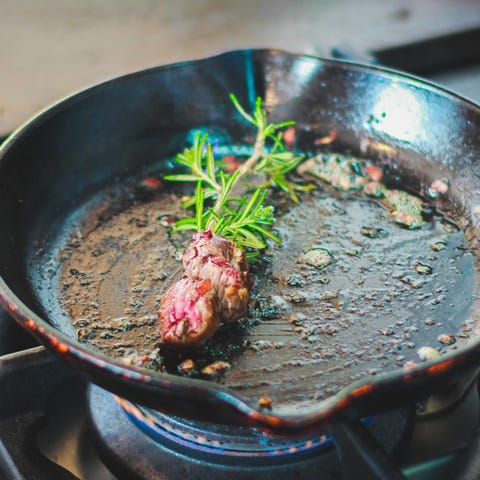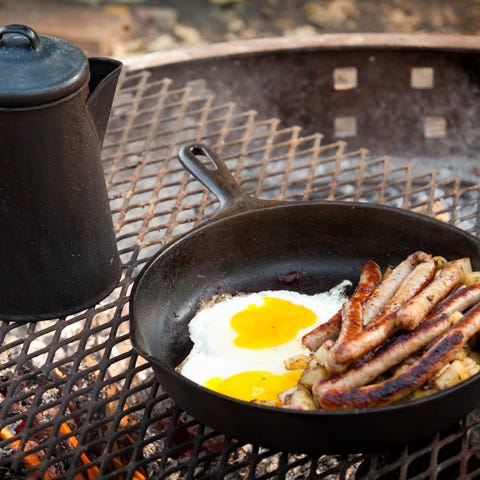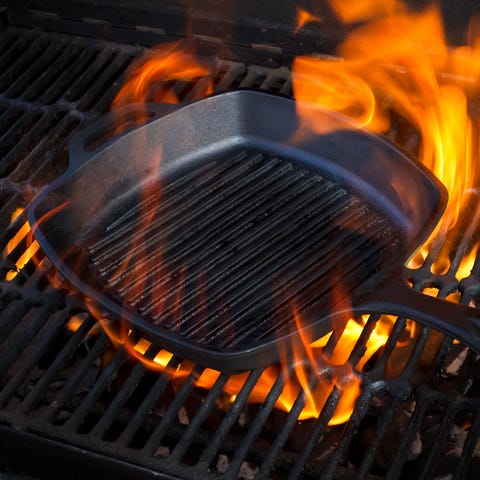Do You Clean Cast Iron After Every Use
A cast-iron pan is the reliable workhorse of the kitchen, but, like a existent equus caballus, it tin go admittedly filthy—and people seem equally skittish about cleaning either.
Ane of the main virtues of iron-carbon alloy (that's the scientific term for cast-iron) is its extreme immovability. In fact, some fans of cast-iron often talk most one pan lasting generations.
Withal somehow there'due south an thought that regular former soap and water is kryptonite to cast iron because you'll wash away the "seasoning." This, coupled with myths nearly using fire to deep-make clean cast-fe, as well as a whole host of other falsities, tin can make the thought of using cast-atomic number 26 for cooking every bit an intimidating endeavor.
And, to meridian it all off, there's the supposed threat that not cleaning your bandage-fe cookware properly can cause you lot to incur some kind of gnarly food-borne affliction.
Fear non.
"There is a lot of misinformation out there almost cleaning cast iron," says Gregory Stahl, who is both co-founder of a Massachusetts-based society defended to collectors of cast iron and a graduate of Harvard Medical Schoolhouse.
Speaking from Stahl'due south experience as a medical graduate, he says not cleaning a cast-iron pan probably won't make yous sick. That's because cooking mostly requires temperatures besides high for illness-inducing leaner to survive.
And so if y'all're heating your nutrient to the USDA'due south safe minimum internal temperatures, your bandage-iron pots and pans will too reach those temperatures (and likely well past).
But equally a collector who personally owns a few chiliad pieces (some worth thousands of dollars), Stahl strongly advises regular cleaning. ""f you don't, you will somewhen become a crusty buildup in the bottom of your pan from burned-on nutrient droppings," he says.
And when that happens—when your pan gets a telltale "textured" bottom—your only recourse is to strip information technology downwards to the bare metal and start the seasoning process all over over again. (If that sounds like a lot of work, yes, it is.) This is also what Stahl recommends if you come up across a secondhand pan that you desire to restore, but more on that later.
So what is this "seasoning" anyway?
"Seasoning" is what protects cast iron from rust and makes for a smooth, nonstick cooking surface. It doesn't have years to build upwardly, just a few rounds in a hot oven between thin applications of oil or lard. About new cast-iron pans come up pre-seasoned (and in that location's always cast-iron enamel pans if you don't want to deal with all this seasoning business).
Considering this is essentially what cooking does—oil, heat, repeat—the more you use a pan, the ameliorate cast-iron cookware abound with each use. Merely that leads some people to remember they should never wash their bandage iron skillets, which isn't the case.
This content is imported from {embed-name}. Y'all may be able to find the aforementioned content in another format, or you may be able to find more data, at their web site.
And then, exercise you clean a cast-iron skillet later on every use?
It depends on what you lot mean past "clean."
Sometimes, after say, grilled cheese, all you may demand is a quick swipe with a dry paper towel and re-seal with a dab of oil and a swirl of the aforementioned paper towel.
Or you cooked salary in the pan ten minutes agone and now the grease has cooled. Take a paper towel or three and wipe out the grease.
Yup, that'southward it.
Just let's say you've make a saucy mess. The all-time fix, says Stahl, is to fill your skillet with water and bring it to a eddy on the stovetop.
Then let it cool enough to scrub with a nylon sponge. Then reseal.
So, do yous re-seal a bandage-iron skillet subsequently every cleaning?
It's a rubber bet.
And before you reseal the pan make certain that you're drying the pan thoroughly. If there are whatever water spots on the pan—on the surface, handle, or the exterior—you may risk something called "flash rust," the light orange particles that tin can appear. While you can easily scrub them off, it's easier to preclude them in the first place.
To reseal, almost any oil will work, as volition shortening or lard, as long every bit your pan is in regular employ.
If you don't plan on using it for a while, those greases and oils with lower fume points tin get rancid. (At that place are products made to combat this, like Crisbee, which is fabricated from beeswax, but Stahl says Crisco works just as well).
Tin yous use Brillo pads? Steel wool?
Eh, non a slap-up idea.
While cast atomic number 26 is tough, you can withal scratch and mar the surface if you're too ambitious with your cleaning. Scars in the surface of the pan—shallow or deep—increase the gamble of rust.
This is the same reason that you should try to avoid metal utensils when cooking with cast-fe. Information technology's not that if a metal fish spatula graces the surface of your pan that its surface will exist immediately and irreparably marred. But you lot exercise run the take chances of scarring the pan if you lot're too rough or an accident causes a scratch. So stick with wood and condom cooking utensils when cooking with cast-iron.
If the pan is nasty, and you've already tried the old eddy-and-wipe method, pour some kosher salt into the pan and scrub it with a paper towel. Rinse and repeat, if needed.
If my pan is clean, why is food still sticking to it? And what is that blackness residue?
That black residue is carbonized food and your food is still sticking to the pan because of it.
During or after you boil the water in the pan, take the edge of a wooden spoon and scrape it against the bits. The water should soften the gnarly bits and the spoon will be able to remove them more than easily that way.
What about burn down- and sand-blasting bandage-atomic number 26 pans?
Stahl never recommends either.
There is an thought that if you stick a pan directly in fire, it will fire away all the debris. Just fire is fashion hotter than an oven, and tin really discolor the metallic, says Stahl. And where seasoning is a chemical bonding process, sandblasting strips away the bodily surface of the metal, non only what's stuck to it. Afterward that, it tin can exist difficult to season, he says.
What should I do if there's rust on a cast-iron pan?
Stahl'south recommended method: Spray the pan inside and out with oven cleaner and tie it inside a plastic bag to keep it from drying out. Later on a few days, take it out and scrub it with soap and water, and then repeat until the dark patina on the pan is completely gone.
This content is created and maintained by a third party, and imported onto this page to assist users provide their email addresses. Yous may be able to notice more information about this and like content at piano.io
Source: https://www.menshealth.com/nutrition/a29608432/how-to-clean-a-cast-iron-skillet/
Posted by: johnsonolcou1989.blogspot.com








0 Response to "Do You Clean Cast Iron After Every Use"
Post a Comment